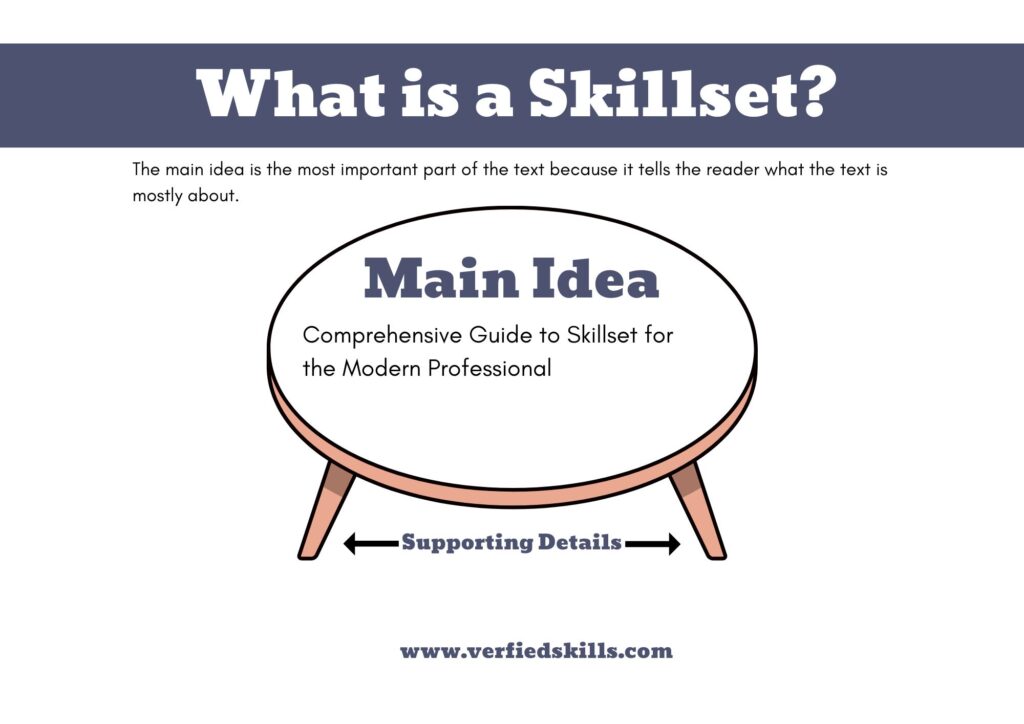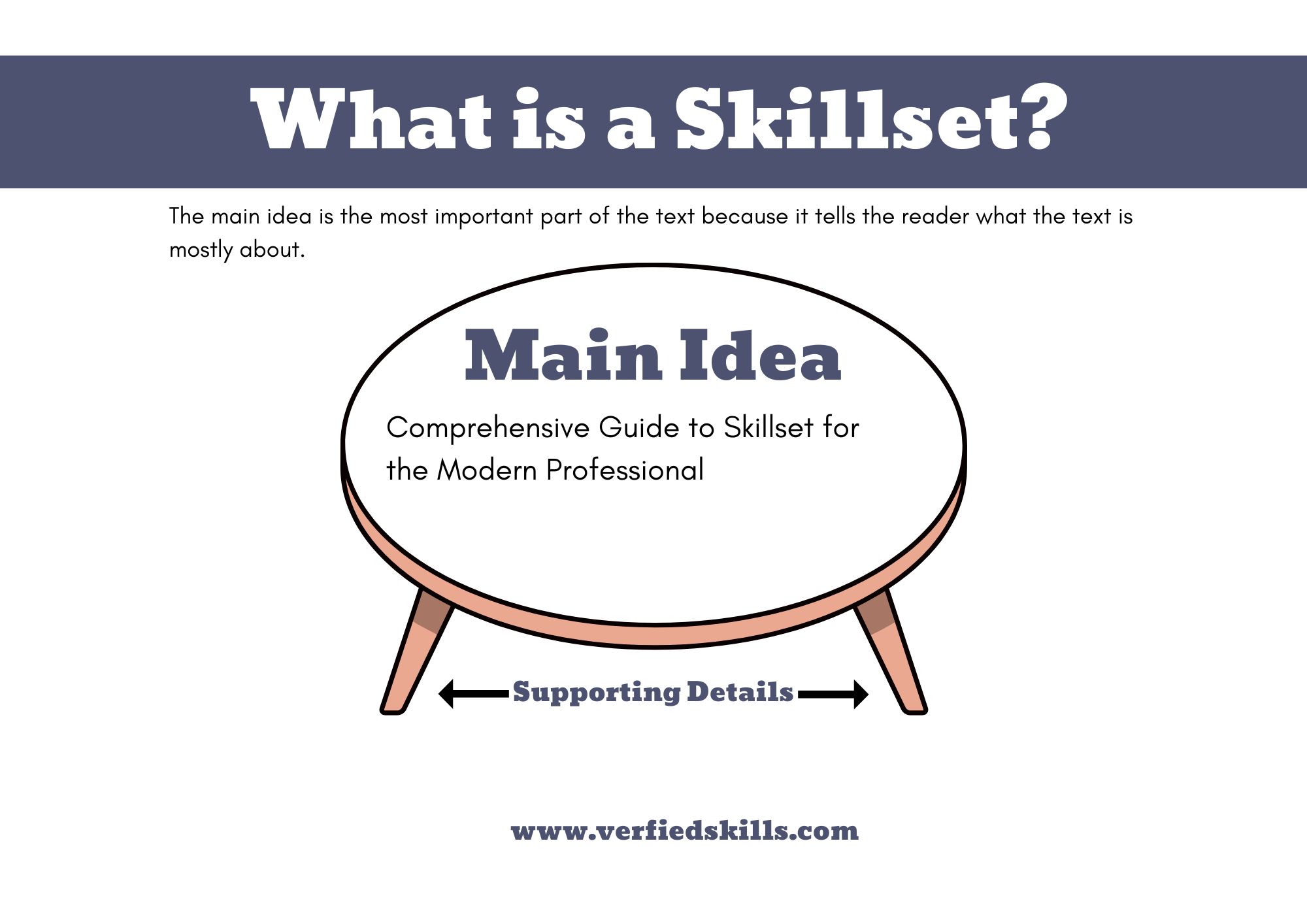Comprehensive Guide to Skillset for the Modern Professional
Outline
- Introduction
- Importance of skillsets in private and expert boom
- The dynamic nature of skillsets within the current process marketplace
- How era, globalization, and innovation have an effect on talent need

- What is a Skillset?
- Definition of skillset
- Hard capabilities vs. Soft competencies
- How skillsets evolve over time
- Categories of Skillsets
- Technical talents (Hard Skills)
- Software Development, Data Science, Engineering, Design, IT Infrastructure, and many others.
- Interpersonal abilities (Soft Skills)
- Communication, Leadership, Collaboration, Conflict Resolution, Emotional Intelligence
- Transferable competencies Time Management, Problem-Solving, Project Management
- Digital abilities Cloud Computing, Cybersecurity, AI, Digital Marketing
- Top In-Demand Skills for 2024
- Emerging tendencies in technology and their impact on skillsets
- Artificial Intelligence (AI) & Machine Learning (ML)
- Blockchain and Cryptocurrency
- Virtual Reality (VR) and Augmented Reality (AR)
- Data Analytics & Big Data
- Cybersecurity
- Industry-specific abilities (Healthcare, Manufacturing, Finance, and so forth.)
- The Role of Soft Skills within the Modern Workforce
- The significance of emotional intelligence, adaptability, and essential questioning
- How gentle abilities make contributions to personal and crew success
- Case studies and examples
- Building a Skillset for the Future
- How to evaluate your current abilities and become aware of gaps
- The fee of continuous getting to know and self-improvement
- Formal training vs. Self-taught capabilities
- How to stay applicable in a hastily converting global
- Tools & Resources to Enhance Your Skillset
- Online studying structures (Coursera, Udemy, edX, and many others.)
- Professional certifications (PMP, AWS Certified Solutions Architect, and so forth.)
- Networking and mentorship
- Which jobs are at risk because of automation?
- How to adapt and reskill for the changing activity landscape
- Key sectors which are embracing automation and AI
- The Future of Skillsets in a Globalized World
- The worldwide talent pool and far off paintings
- Multicultural and multilingual skillsets
- Understanding how globalization reshapes job markets
- FAQs: Frequently Asked Questions approximately Skillsets
- What is the difference between tough abilities and smooth talents?
- How do I identify the right abilities for my career?
- Which abilities are in demand proper now?
- How do I build a numerous skillset?
- Can I research new capabilities at the same time as working complete-time?
- How do I improve my smooth abilities?
- Conclusion
- Emphasizing the want for continuous increase and flexibility
- The lengthy-term benefits of a well-rounded skillset
1. Introduction to Skillset
In these day’s fast-paced international, skillsets have become the cornerstone of professional achievement. Gone are the times when an person may want to rely solely on one set of capabilities to carry them thru a whole profession. As industries retain to adapt, so too do the skill necessities that workers ought to meet. Whether it’s the fast advancement of generation, globalization’s impact at the team of workers, or the ever-changing wishes of contemporary organizations, the call for for brand spanking new abilities is unheard of.
As we circulate in addition into the virtual age, traditional skillsets are now not sufficient. People these days want to own a wide spectrum of skills, mixing technical information with social, cognitive, and emotional intelligence. These abilities no longer simplest enhance job performance however additionally empower individuals to develop in my opinion and professionally.
The growing significance of various skillsets inside the job marketplace is exemplified by how certain industries are being transformed through automation, artificial intelligence, and statistics-driven decision-making. Jobs that once required manual hard work or ordinary tasks are now being taken over by using machines, and workers ought to pivot closer to greater superior roles that require creativity, strategic questioning, and technical proficiency.
Moreover, with the upward thrust of faraway work and worldwide groups, a new call for for pass-cultural competencies and virtual literacy has emerged. These elements underline the significance of cultivating a well-rounded, adaptable skillset.
2. What is a Skillset?
A skillset is a group of talents and competencies that an character possesses and applies to perform unique responsibilities or capabilities correctly. These can be a combination of technical know-how, behavioral tendencies, and interpersonal competencies that form how someone works and interacts with others.
Hard Skills vs. Soft Skills
One of the maximum fundamental differences in skillsets is between tough skills and smooth skills:
- Hard abilities are tangible, teachable abilities that can be measured and quantified. Examples encompass programming languages (like Python), information evaluation, engineering, or talent in software consisting of Microsoft Excel.
- Soft skills, alternatively, are intangible developments that relate to how an character interacts with others and procedures tasks. These skills consist of communique, management, teamwork, and hassle-solving.
While each difficult and soft abilities are critical, employers regularly emphasize the aggregate of each for well-rounded specialists. Hard abilities may additionally get your foot inside the door, however soft talents decide your potential to thrive within the place of work and adapt to change.
How Skillsets Evolve Over Time
The panorama of skillsets isn’t always static. As industries exchange and technology increase, the skillsets required to succeed are also in regular flux. In current years, we’ve seen a speedy shift in the direction of digital and technical proficiencies, along an growing emphasis on emotional intelligence and adaptability. Skills along with coding, information technology, and virtual advertising and marketing have gained prominence, whilst competencies like conventional bookkeeping or guide statistics entry have emerge as much less applicable.
Additionally, the cutting-edge workforce must focus on transferable skills, which may be implemented across numerous jobs and industries. Skills like time management, leadership, and hassle-fixing are not restricted to one profession but are important in almost any role.
3. Categories of Skillset
Technical Skills (Hard Skills)
Technical skills are important for fields like engineering, software development, statistics science, and healthcare. These skills are directly related to the job handy and require specialized education. Some examples include:
- Software Development: Proficiency in programming languages like Java, Python, and JavaScript
- Data Science: Knowledge of gadget mastering algorithms, facts visualization, and tools like R, Python, or SQL
- IT Infrastructure: Cloud computing, networking, and security systems
- Design: Graphic design, UX/UI, Adobe Creative Suite
Interpersonal Skills (Soft Skills)
While difficult skills are crucial, soft skills are increasingly crucial inside the place of work. Employers cost candidates who are not simplest technically talented but additionally emotionally smart and effective of their interactions with others. Examples encompass:
- Communication: Verbal and written verbal exchange, active listening
- Leadership: The capability to encourage, guide, and have an impact on others
- Collaboration: Teamwork, war resolution, empathy
- Adaptability: Adjusting to new environments, managing exchange with grace
Transferable Skills
These talents are precious in any activity or enterprise. Transferable abilities inclusive of trouble-fixing, multitasking, task control, and crucial wondering offer a foundation for profession mobility.
Digital Skills
In the twenty first century, virtual literacy is critical. Whether it’s navigating a content material control device, know-how data analytics, or having a operating information of artificial intelligence, virtual competencies are in high demand. Common virtual abilities include:
- Cybersecurity: Understanding the way to defend systems and facts from digital threats
- Cloud Computing: Knowledge of platforms like AWS or Microsoft Azure
- Digital Marketing: search engine optimization, SEM, content material marketing, social media method
4. Top In-Demand Skills for 2024
As the world keeps to conform, the demand for positive talents shifts. Here are a number of the maximum sought-after abilities in 2024:
Artificial Intelligence (AI) & Machine Learning (ML)
AI and ML are reworking almost each industry, from healthcare to finance. Professionals with understanding in AI algorithms, neural networks, and deep mastering are particularly valued.
Blockchain and Cryptocurrency
Blockchain era has moved beyond cryptocurrency into industries like deliver chain management, healthcare, and finance. Skills in blockchain development and cryptocurrency applications are becoming greater prominent.
Cybersecurity
With the increasing reliance on virtual equipment, the need for cybersecurity professionals is greater than ever. Protecting records and systems from hackers is critical, and the demand for professionals in this area is anticipated to develop.
Data Analytics & Big Data
As agencies accumulate greater records, the need for skilled professionals to analyze and interpret this information will become crucial. Knowledge of tools like Python, R, SQL, and Tableau is rather suitable.
5. The Role of Soft Skills inside the Modern Workforce
While hard capabilities might assist you land a task, it’s regularly your gentle competencies that will help you be triumphant in the long time. Employers are increasingly spotting that personnel who can collaborate, lead teams, adapt to alternate, and deal with traumatic situations are important to a company’s achievement.
6. Building a Skillset for the Future
Building a destiny-proof skillset includes assessing your cutting-edge competencies, figuring out gaps, and usually mastering. By embracing each hard and soft skills, specialists can
remain applicable and aggressive.
7. Tools & Resources to Enhance Your Skillset
To construct your skillset, there are infinite resources to be had, which include on line platforms like Coursera, Udemy, and edX. Certifications in fields like project management, IT, and cloud computing also can raise your qualifications.
8. The Impact of Automation on Skillsets
As automation and artificial intelligence preserve to reshape industries, people need to discover ways to reskill and adapt to the future process market.
9. The Future of Skillsets in a Globalized World
Globalization has created an interconnected international wherein new competencies are required to manipulate various teams, work throughout borders, and understand distinctive cultures.
10. FAQs
Q1: What is the distinction among tough abilities and gentle skills?
Hard competencies are technical competencies, at the same time as gentle skills are interpersonal trends.
Q2: How do I perceive the right skills for my career?
Assess your interests, studies activity descriptions, and examine current industry tendencies to perceive the proper skillset.
Conclusion
In end, cultivating a numerous skillset is essential for personal and expert boom. As the workplace evolves, so too should the abilities we accumulate. Through continuous studying and adaptability, we will ensure we stay valuable and prepared for the destiny.
